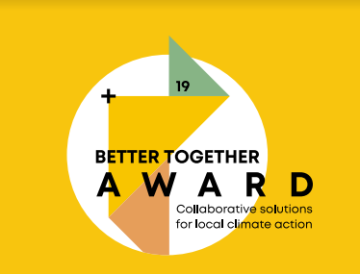
In 2019, momentum is finally growing to take climate action seriously - and inspire a new wave of solutions across the globe: The current movement #FridaysForFuture brings thousands of students worldwide to the streets, demanding more radical climate policies. A burning summer with droughts and crop failures hit the world last year - and raised a much broader public awareness. With this deepening empathy for the crisis comes the opportunity to now turn heads on powerful solutions and new collaborations.
Good timing for the Better Together Award (BTA): A global call for applications to find the best collaborations for climate action between cities, governments or administrations on the one hand and start-ups, SMEs or NGOs on the other. These cross-sector partnerships promise high potential and long-term impact for climate mitigation and/or adaptation.
Applications for the award are now open until 24 March 2019:
www.bettertogetheraward.org
“Climate Action, Clean Energy, Sustainable Cities and Communities are among the UN Sustainable Development Goals that are right at the heart of the Better Together Award”, explains Maja Rotter, project lead at Impact Hub Berlin, who is facilitating the BTA. Together with the German Federal Ministry for the Environment (BMU) and Deutsche Gesellschaft für Internationale Zusammenarbeit (GIZ) the partners offer valuable benefits for Award winners:
Connect & Learn: The five winning teams will be invited to Europe’s startup hotspot Berlin for an intense 5-day innovation journey in May, tailored to their needs. They’ll meet renowned urban transition experts, leading climate start-ups and deep dive into Berlin’s climate innovation ecosystem.
The challenge & potential of local climate collaborations
- Large amounts of resources could be saved in urban areas through the high number of inhabitants and the concentration of economic activity
- Creative teams, decision makers and facilitators among sectors can all connect for holistic solutions in the city’s melting pot
- Innovative players need more traction and user data which can be provided by the public sector. The public sector needs more agile and experimental thinking to cope with the climate complexity - which innovators can deliver. In the physical open spaces and testing grounds of cities they can meet and progress together

